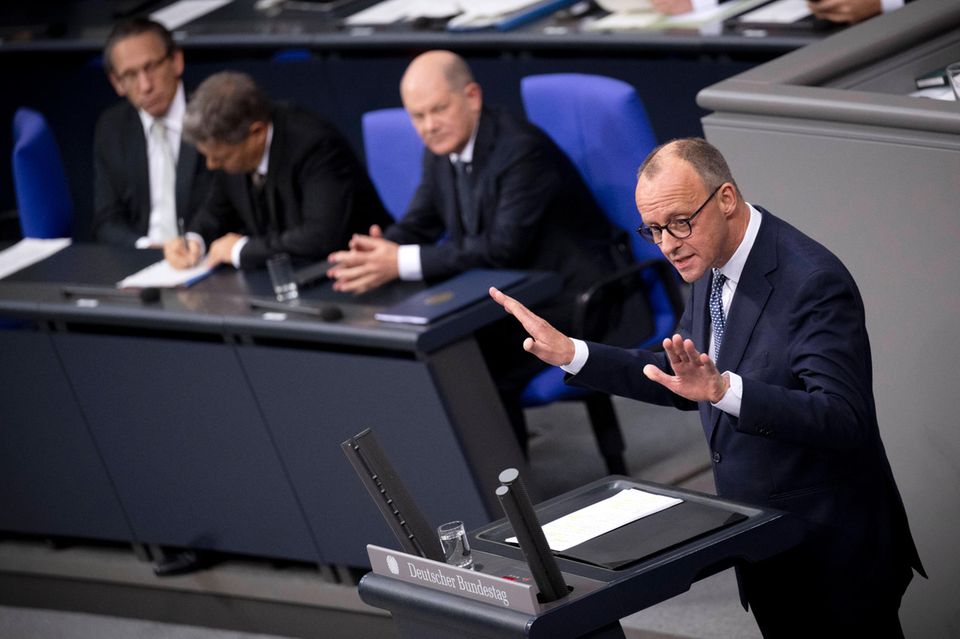Federal election: Grupp: “It’s a shame” about the FDP – Voices from the business world on the election

After the federal election, the signs point to a coalition between the CDU/CSU and the SPD, and Friedrich Merz (CDU) will probably become chancellor. What does the economy think about the results?
The weakening economy was considered a decisive issue in the federal election – the leaders of the business associations and the trade unions followed the election evening with corresponding attention.
Wolfgang Grupp junior, managing partner of Trigema, called for a "turnaround" after the election in an interview with Capital, but regretted the poor performance of some traffic light parties. "I find it particularly unfortunate that the FDP, as a party of the liberal center, is no longer in parliament," said Grupp. However, this will hopefully make the formation of a government easier and faster. "I would have found a black-green coalition, with the views represented by the Greens in Baden-Württemberg, to be a positive thing."
Antje von Dewitz, managing director of the mountain sports outfitter Vaude, also placed her hopes in a stable government that could address "the pessimism and dissatisfaction" in the country. "However, in order to competently address the urgent future-oriented sustainable direction, I am sorry that the Greens are probably not on board," Dewitz told Capital.
The president of the “Family Businesses” group also calls for a quick turnaround from Friedrich Merz (CDU). “Our country cannot cope with another legislative period without real economic reforms,” wrote Marie-Christine Ostermann.
Federal election: Clear mandate for an economic turnaroundMarie-Christine Ostermann, President of the association DIE FAMILIENUNTERNEHMER: "The voters have decided: This is a clear government mandate for the Union and Friedrich Merz."
More: https://t.co/mufBD35u01
— THE FAMILY ENTREPRENEURS (@FamUnt) February 23, 2025
The President of the Federal Association of Volksbanken and Raiffeisenbanken, Marija Kolak, also called for a "fresh start": "It is time for politics and business to work together to overcome the standstill of recent years and embark on a growth path that will unleash confidence and innovative strength." She appealed to the parties not to negotiate for long periods of time, but to quickly agree on reform goals. Above all, "in housing construction, pension provision, reducing bureaucracy and strengthening small and medium-sized businesses."
Jörg Dittrich, President of the Central Association of German Crafts, agreed in an interview with ZDF on election night. A long process of forming a government cannot be afforded, an "immediate change of direction" is needed. "Germany's competitiveness is at stake."

Peter Leibinger, President of the Federation of German Industries (BDI), is also calling for rapid reforms. "The backlog of decisions and actions in many issues that are vital to the economy, such as reducing bureaucracy, government investments, energy supply and security policy, needs to be resolved urgently," Leibinger said, according to the Reuters news agency. Christian Bruch, CEO of Siemens Energy, called for impetus in energy policy, as expected. "The expansion of gas-fired power plants, the strengthening of wind energy and the modernization of the power grids are essential for this, as is a secure supply of raw materials."
According to Christian Sewing, CEO of Deutsche Bank and President of the Association of German Banks, the future German government must have the strength to take on a leadership role in Europe. "Especially in these turbulent times, Europe needs a strong Germany that is prepared to take on responsibility," said Sewing.
The unions are also calling for speed. "Industry and employees cannot wait months for clear prospects," wrote IG Metall boss Christiane Benner. "They need concrete commitments as soon as possible. Confidence can only be achieved if the democratic parties now quickly turn their attention to coalition negotiations and the formation of a government." Specifically, competitive energy costs, a ramp-up of electromobility and investments in infrastructure and digitization are needed.
Yasmin Fahimi, chairwoman of the German Trade Union Confederation and SPD member, was concerned about the AfD's strong performance. "I would of course have liked a clearer signal that the parties of the parliamentary-democratic center would receive a clearer mandate to govern," said Fahimi in an interview with ARD on election night. "Almost 20 percent for the AfD is 20 percent too much and not a clear sign of the economic stimulus that we need now."
Christoph Ahlhaus, Federal Managing Director of the BVMW Association of Small and Medium-Sized Enterprises, doubts that anything will change quickly in the economy - and therefore did not want to join in the Union parties' celebrations. "I cannot understand the triumphal cries from the Adenauer House today. We have no clear results," Ahlhaus told ARD. "It is not clear how the Union is supposed to implement the program that it has also promised the economy."
Economists call for reform of the debt brakeEconomists also followed the election. In an interview with the Reuters news agency, economic expert Monika Schnitzer called for rapid coalition negotiations. In order to manage the necessary investments in security, education and infrastructure, a reform of the debt brake is needed. "One can only hope that, in view of the security and economic policy challenges, a coalition agreement can be reached quickly and constructively that will move the country forward."
Marcel Fratzscher, President of the German Institute for Economic Research, fears, however, that even a two-party coalition will have difficulties. "Urgently needed reforms will largely be impossible as a result, and social polarization and the continued rise of the AfD will be the inevitable result," said Fratzscher. "For the economy and companies, a further decline would be unavoidable."
With Dpa and Reuters
capital.de






